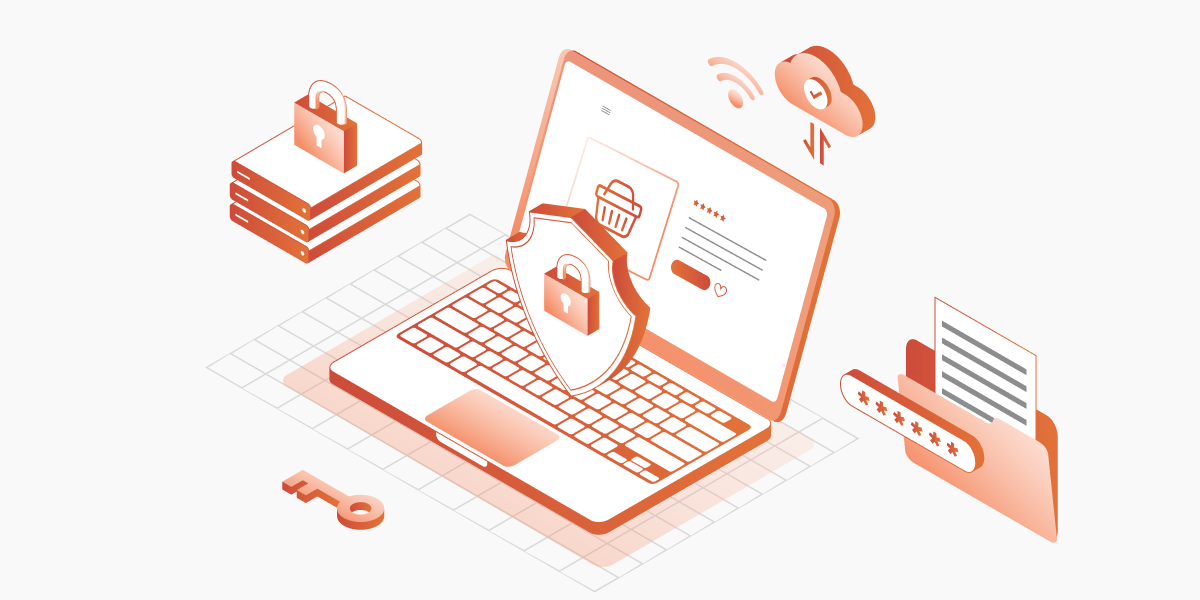Ukrainian experience: How to protect your eCommerce business from Cyber Attacks
Written by
Editorial TeamPublished on

The exponential growth of the e-commerce market has made cybersecurity a priority for businesses worldwide. Data from Juniper Research suggests that by 2023, online fraud will result in global losses of $48 billion, with Europe particularly vulnerable to cyberattacks. This was highlighted by the events of 2022, which prompted companies to prioritize their cybersecurity measures.
The Ukrainian experience provides a valuable lesson for companies looking to protect their e-commerce business from various threats. In 2022, the country was hit with cyber-attacks resulting in significant financial losses to companies and individuals.
In response, the government launched an online security campaign to educate people about cyber safety and provide them with the necessary tools and resources to protect themselves. This included measures such as two-factor authentication, setting up firewalls, regularly updating software, and keeping track of online usage.
E-Commerce Security in Ukraine
Research shows that over the past five years, the online trade market in Ukraine has grown five times, reaching $4 billion by the end of 2020, representing 8.8% of the total retail volume. This robust growth was driven by a growing number of consumers turning to online platforms for their shopping needs and technology’s increasing availability and affordability.
The outbreak of war in Ukraine in 2022 brought about significant financial losses for many companies, as physical destruction of warehouses occurred. However, regarding e-commerce security, large e-commerce businesses were not affected by the war. This is because they had taken all necessary measures to minimize the security threats.
These measures included treating e-commerce security as an essential practice and maintaining servers physically located outside of Ukraine. This approach enabled these businesses to protect their online stores from threats, unlike public companies and companies that provide infrastructure for the country’s operations, which suffered from massive DDoS attacks.
This is a powerful reminder of the importance of robust e-commerce site security measures for businesses operating in uncertain times. It highlights the fact that investing in e-commerce security can help businesses, especially e-commerce stores, protect their assets and continue to work even in the face of crises. This is why companies must prioritize solving e-commerce security issues to mitigate the potential impact of any future events that might threaten their operations.
E-commerce Security on a Global Scale: The Impact of the 2022 Hacker Attacks
2022 was marked by a series of devastating cyber-attacks targeting some of the world’s most recognizable companies.
LastPass Security Breach
One of the most high-profile incidents occurred at LastPass, a personal password storage company with over 33 billion users. Despite the company’s reputation for providing top-notch security, it was breached for the second time in just one year, leaving online store owners to ponder the potential damage that could have been inflicted on their businesses.
Okta Cybersecurity Attack
Another similar incident occurred at Okta, a company specializing in creating IDM systems that protect user authorization. However, unlike LastPass, which primarily serves the corporate sector, Okta’s client base is much broader, resulting in breaches for many Fortune 500 companies that had trusted the company to safeguard their sensitive user account information and client data.
These high-profile incidents serve as a harsh reminder of the importance of robust security measures for e-commerce businesses of all sizes.
Without proper security protocols in place, companies risk losing the trust of their clients and the potential for financial fraud from breaches, in addition to reputational damage. As the e-commerce industry continues to expand, it’s more important than ever for online businesses to prioritize website security and take the necessary steps to protect themselves and their customers.
Why is E-Commerce Security More Important than Ever?
The world of e-commerce is vast and ever-expanding, with sales reaching an astounding 5.7 trillion dollars in 2022 and experts forecasting this number to soar to 8 trillion dollars by 2026. With such a staggering amount of money at stake, it’s no surprise that hackers are increasingly targeting e-commerce sites in search of financial gain.
While one might assume that this money is spread among countless online businesses, the reality is far more concerning. As cybercriminals continue to find and exploit vulnerabilities in e-commerce sites, they can use the same tactics to infiltrate thousands of other stores using similar software. In other words, a single breach of a website’s security can lead to attacks.
It’s a harsh reality but one that e-commerce sites must confront head-on. The fact is that website security is no longer an option for online businesses but a necessity. As the e-commerce industry continues to grow, so will the security threats it faces.
Therefore, e-commerce businesses must stay vigilant and proactively protect themselves from cyber threats. This includes regularly updating software, implementing robust security protocols, and monitoring suspicious activity.
Ignoring the issue of cybersecurity is no longer an option for e-commerce sites. With more money at stake than ever, online companies must take the necessary steps to protect themselves and their customers.
What is the first step in developing an e-commerce security plan?
As the world becomes increasingly digitized, security threats have become an ever-present concern for any e-commerce site. In the realm of e-commerce, this threat is particularly pressing, as online stores hold valuable customer data and financial information that is highly sought after by hackers.
It’s important to understand that protecting your business from hacking is not a one-time task but rather an ongoing process. An online store may have had strong protection in the past, but that does not guarantee that it will remain secure. Cybercriminals are constantly developing new methods of attack, and businesses must remain vigilant in their efforts to protect themselves.
To combat the ever-evolving security threats, experts recommend taking a three-pronged approach, including prevention, regular maintenance, and special protection measures.
Cyber Security Prevention
As e-commerce businesses grow, data protection and cyber security have become increasingly important. One of the critical steps that e-commerce stores can take to protect themselves from cyber threats is to adhere to the Payment Card Industry Data Security Standards (PCI DSS).
These requirements are an industry data security standard, providing guidelines for businesses that handle credit card transactions, and following them can significantly increase the level of protection of any e-commerce store.
12 requirements of Payment Card Industry Data Security Standards:
- Install and maintain a firewall configuration to protect cardholder data
- Do not use vendor-supplied defaults for system passwords and other security parameters
- Protect stored cardholder data
- Encrypt transmission of cardholder data across open, public networks
- Protect all systems against malware and regularly update antivirus software or programs
- Develop and maintain secure systems and applications
- Restrict access to cardholder data by business need to know
- Assign a unique ID to each person with computer access
- Restrict physical access to customer data
- Track and monitor all access to network resources and cardholder data
- Regularly test security systems and processes
- Maintain a policy that addresses information security for all personnel
Due to the war, the team of Perspective is geographically dispersed across different parts of Ukraine and Europe, and many people work remotely and use many other communication channels.
While the war in Ukraine may have created additional challenges for businesses operating in the region, with the right tools and best practices in place, it’s possible to protect against attacks and ensure the continued success of e-commerce operations.
Secure Access Management
It is essential to develop rules for the transfer of access and to use multiple channels for communication and login credentials. For example, a temporary password sent through a separate channel can provide an added layer of security.
Another way is using a passport repository system that automatically deletes data after it has been accessed and used for the first time. By following this practice, e-commerce businesses can further reduce the risk of data breaches and protect their client’s sensitive information.
Multi-Factor Authentication
Implementing robust security management systems is crucial as businesses and organizations strive to gain access to data, such as credit card details, and protect it from hacking. One of the most effective ways to do this is through multi-factor authentication (MFA).
Two-factor authentication (2FA) is a popular method of MFA that has proven to be highly effective in providing an additional layer of security. Unfortunately, the essence of 2FA is often misunderstood. To truly understand how 2FA works, it is essential to remember the following principle: the first factor is something the client knows, such as a password, and the second factor is something the client has, such as a mobile device or a one-time password sent via SMS.
When the system asks the user for additional information, such as a date of birth, it is not considered an actual “second factor” of authentication.
Much e-commerce software, such as Magento, already has 2FA built-in. It’s important to note that one-time passwords do not have to be sent via SMS. They can also be sent via instant messaging or through a mobile application for 2FA, which is often free of charge.
Implementing MFA, particularly 2FA, is an essential step in ensuring the security of sensitive information. Not only does it provide an additional layer of protection, but it also helps to mitigate the risk of unauthorized access to sensitive information. This is particularly important for businesses and organizations that process sensitive data and must comply with strict information security regulations.
In addition, it is vital to review and update information security management systems regularly to ensure that they remain effective in protecting sensitive data. This includes regular software security updates, suspicious monitoring activity, using anti-malware software, and providing regular training to employees on best practices for data security.
Regular maintenance of the protection level
Cybersecurity is an ever-evolving field, and one of the most critical practices for protecting sensitive information is to keep software and security certificates updated.
Security Patches and Updates
Regular maintenance and security updates, including security patches, ensure vulnerabilities are identified and eliminated before malicious actors can exploit them.
For example, the e-commerce platform Magento releases such patches monthly, addressing security vulnerabilities discovered in the software. These patches are designed to address security issues, such as those listed in the Common Vulnerabilities and Exposures (CVE) catalog, which is regularly updated to reflect the latest threats.
While updates and patches are essential for keeping software secure, it’s important to note that hackers can also target the online store through user accounts. To mitigate this risk, it’s recommended to provide access to sensitive information only to those employees who need it for their work and only to the extent necessary for their role.
SSL Certificates
Furthermore, using an SSL certificate is always a part of e-commerce security best practices. This digital certificate authenticates the identity of a legitimate website and encrypts information sent to the server using SSL technology. This helps to protect customers’ data, such as credit card data and login credentials, from financial fraud.
Security practices
Additional security measures are using strong passwords, not using the same password for different services, and ensuring that all employees are trained to identify and avoid phishing scams, SQL injection, and other malicious software.
To conclude, regular updates, patches, strict access controls, and employee training are all essential components of a comprehensive cybersecurity strategy.
Professional Security Testing
As the threat landscape of cybersecurity continues to evolve, e-commerce websites need to take proactive measures to protect sensitive data and systems from malicious code and attacks.
What is Penetration Testing and How Does it Work
One critical aspect of this is penetration testing, also known as “ethical hacking,” which involves simulating hackers’ attacks on a computer system to identify vulnerabilities that malicious actors can exploit.
Penetration testing is a complex and nuanced process, typically carried out by a specialized team of e-commerce security experts. The testing process covers many potential threats, such as brute force attacks, DDoS attacks, and other forms of malicious code.
The testing process simulates the most common types of attacks, such as those outlined in the OWASP Top 10, a widely recognized list of the top 10 vulnerabilities in the world.
The primary goal of penetration testing is to identify vulnerabilities and weaknesses in a company’s systems and infrastructure and to provide recommendations for how to address them.
The testing process should also produce a detailed report outlining what areas of the system have passed a successful check, what areas need additional attention, and where there are problems that need to be corrected urgently.
It’s important to note that penetration testing is only one aspect of a comprehensive cybersecurity strategy. A multi-layer security approach that includes a secure environment and monitoring key systems is essential to ensure that companies are protected against a wide range of potential threats.
In conclusion, penetration testing is critical to any company’s cybersecurity strategy and should be a regular part of the overall security review process. By simulating attacks, companies can identify vulnerabilities and take steps to mitigate them.
Additionally, a multi-layer security approach and SSL certificates are crucial to protect the company from malicious code and attacks, to provide a secure environment, and to monitor key systems.
The Importance of Having a Plan B: What to do if the cyber attack succeeds?
As an online business, the security of your online e-commerce store or site is of the utmost importance. Unfortunately, no matter what security measures you take, there is always the possibility of a breach. For this reason, it’s essential to have a plan B in place in case the system has already suffered a disorder.
Security Backup and Recovery
One of the most critical measures is automating data backup and recovery processes. This ensures that even in the event of a breach, you will still have a copy of your customer and order database and other critical business information.
It’s also essential to have a backup or test server in place that you can use in case of a crime. This allows you to quickly restore your site and minimize the impact of a security breach.
Service Level Agreement
Another vital aspect of e-commerce security is having a Service Level Agreement (SLA) with a technical contractor. This guarantees the quality of service in case of a malicious attack on your site.
We at Perspective specify the following things in the SLA:
- Fixed time to respond in case of a crime,
- Fixed time for a quick decision.
- Fixed time for a permanent decision.
For example, the contract may specify that the contractor within 2 hours should resume the site’s functioning, regardless of whether it occurred during or outside business hours.
Additionally, it is crucial to educate the employees and customers about suspicious links, phishing, and cyber-attacks, to detect and report them. This can help reduce the risk of cyber-attacks and minimize the impact of any attack.
In conclusion, protecting your online business from security breaches is a continuous process that requires a multi-layered approach. By automating data backup and recovery processes, having a backup server, and an SLA with a technical contractor, you can ensure that your online e-commerce store is prepared to respond quickly and effectively in case of a breach. Furthermore, the education of the employees and customers is crucial to detect and reporting suspicious links.
Conclusion
As the world continues to shift towards online commerce, protecting e-commerce sites from attacks becomes increasingly crucial. With the vast amounts of personal and financial data stored on these sites, any e-commerce website must ensure that its customers’ information is secure. One of the most common e-commerce site security threats is data breaches.
Common e-commerce security threats include hacking, phishing, cross-site scripting, and third-party integrations. To mitigate these risks, companies must implement robust data protection measures, such as encryption, firewalls, phishing protection software, and intrusion detection systems.
Another critical consideration for any e-commerce website is compliance with regulations such as the General Data Protection Regulation (GDPR). This EU law, which went into effect in 2018, sets strict standards for handling personal data and imposes significant fines for non-compliance.
The penalty for non-compliance with GDPR may be as high as 2-5% of the company’s annual turnover, making it essential for companies selling online to understand and comply with the regulation to protect their customers and their bottom line.
Companies must be proactive to stay ahead of the curve in e-commerce security. This means selecting responsible partners and contractors, testing systems and protocols regularly, and staying informed about the latest threats and trends in the field. By taking these steps, companies can ensure that their customers’ data is safe and that their businesses are protected from costly breaches and penalties.
Meet the author, Artur Potulny, and Perspective team at the E-commerce Berlin Expo 2023:


